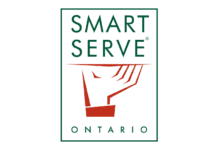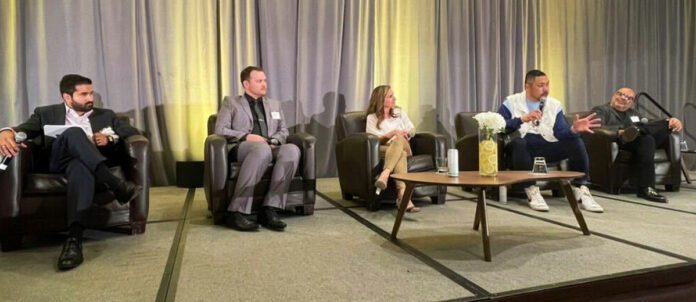TORONTO — At Kostuch Media Ltd.’s (KML) inaugural Top 30-Under-30 Leadership Summit: Future Forward held June 13 at the Sheraton Centre Toronto, the topics of sustainability and DE&I took centre-stage for the afternoon panel discussions.
The Environmental Stewardship panel, moderated by Rosanna Caira, editor and publisher, KML, featured Emily Robinson Food Education manager, University of Guelph; Kate Longmire, VP, Foodservice Marketing & Innovation, Maple Leaf Foods Inc.; and Marina Elsener, director, Sustainability & DEI for Accor.
The panel began with a discussion around the evolution of what sustainability means to the industry.
“When the industry first started making inroads on sustainability, it was built on the mantra of reduce, re-use, recycle,” said Caira. “But now the definition of sustainability has changed quite dramatically and covers so much more.”
The panellists each took the opportunity to highlight what sustainability means to their organization.
“We define it as addressing the needs of our current consumer base and the current world, while still protecting the needs of the future,” said Longmire. “For us, it’s all-encompassing and it’s evolved from an avoidance strategy and simply not making things worse, to re-generation.”
Robinson says her research has shown that the traditional definition of sustainably — meeting the needs of the present without compromising the needs of future generations — has had to evolve over the last couple of decades because while it’s a “beautiful sentiment, what does that actually mean? As a restaurant operator, how can you actually apply that to your day-to-day operations?” she said, adding the discussion has moved from reduce, re-use, recycle to one more focused on achieving net zero and closed loop and trying to keep resources in a finite system. She also said there is an increased focus on sourcing and knowing just where our food is coming from.
While Fairmont/Accor has countless sustainability initiatives in place, Elsener spoke to three of them during the panel: carbon, food and waste. Addressing the issue of carbon emissions, she said “In December 2019, we commenced the latest stage of our climate journey with a commitment to setting a science-based target [with respect to carbon emissions]. We have also made a long-term commitment to reach net-zero carbon emissions by 2050.”
The panellists went on to discuss how this changing definition of sustainability has changed how their organizations approach the topic from a strategy standpoint.
“The major change is that before, sustainability was a strategy for our organization, and today it is our strategy,” said Longmire. “We have a blueprint that guides all we do and there are 35 initiatives within the blueprint that align with the company’s pillars of sustainability.”
Robinson reminded the audience that “the more we learn and understand about the impact of some of our daily choices, it becomes clear that some choices will have more impact [on the environment] than others. As a chef or restaurant operator, you have the ability to educate your consumers.”
Building Safe Spaces
The final panel of the day focused on diversity, equity and inclusion in the hospitality industry. Moderated by Cyrus Cooper, professor & program coordinator at Centennial College, the panellists included Trevor Lui chef and founder, Quell; Rajesh Uttamchandani, Chief People Officer, Applyboard; Juanita Dickson president, Gusto 54 Restaurant Group; and Kevin Barrington, manager, Talent & Culture Fairmont Hotels and Resorts.
“We’ve all heard the terms diversity, equity and inclusion,” said Cooper by way of introduction to the session. “It shouldn’t be a buzzword; it should be a reality. It is something that is good business and something that leads to innovation creativity and knowledge. So, I want to ask our panellists, what does DE&I mean to you personally?”
“If I had to sum it up in one word, I’d say belonging,” said Dickson. “As a business, that means being able to provide opportunities regardless of who you are and to make you feel as if you belong.”
Lui then spoke to how businesses can ensure that they keep DE&I top of mind. “DE&I is about basic values,” he said. “Everyone is on their own journey and one of the biggest challenges we’re facing right now is that people are really scared of this topic. We were scared of recycling 15 years ago, now we’re scared of people. We always knew that the hospitality industry was flawed, but we really found out how flawed it was during COVID and we’re still having problems acknowledging those problems. The power structure [in the industry] is what’s preventing us from acknowledging them. So, I talk about DE&I as understanding and acknowledging that the power structure has to be there with us in order to move forward.”
At Fairmont, Barrington says they’ve adapted their job descriptions and hiring practices to make it not only more inclusive, but welcoming to anyone who wants to apply and work for the company. “A big part of it is strategic partnerships,” he said. “It’s hard to think that one group of people can be something for everyone. So, what are strategic partnerships you can make with different organizations to bring talent to you?”
The conversation then switched gears, with Uttamchandani addressing the topic of international students, startups and incubators and what they bring to the table here in Canada. “The grit that someone builds when they leave their home and land somewhere they don’t know is hard to build otherwise,” he said. “They also bring a different view of work and culture, and how they relate to people, and that adds value.”
Be sure to read all the coverage of the Top 30-Under-30 Leadership Summit: Future Forward event in the July/August issue of Hotelier magazine.

















